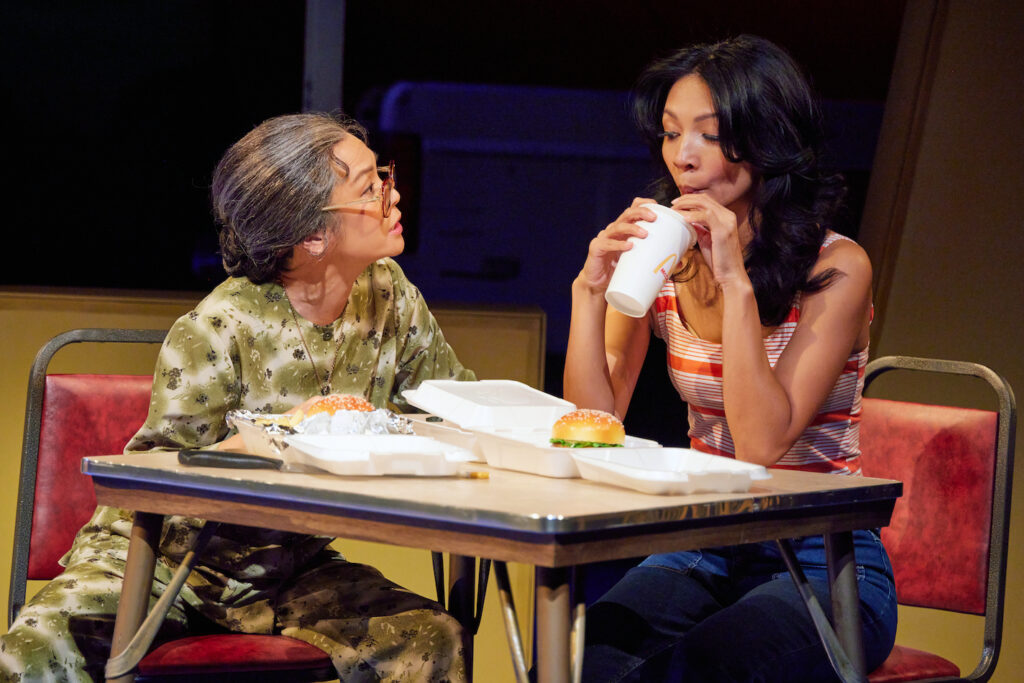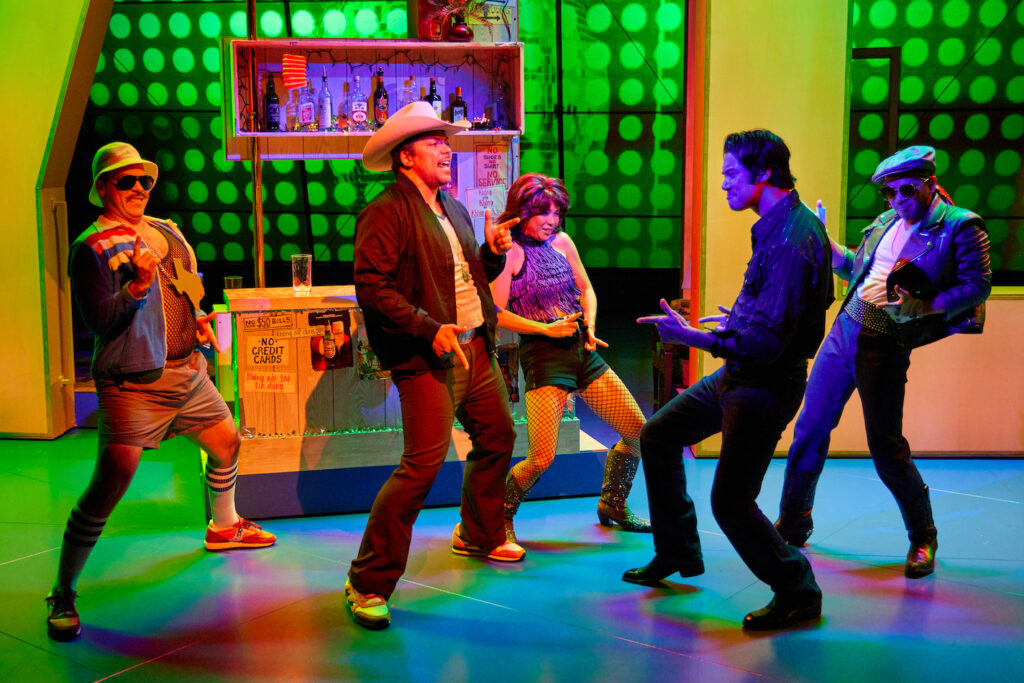Theater Review by Carole Di Tosti . . . .
The versatile Qui Nguyen, Co-Founder of the acclaimed theater company Vampire Cowboys, notable for its productions of She Kills Monsters, Revenge Song, and others, has brought Poor Yella Rednecks to Manhattan Theatre Club. It is a must-see for its unique, multimedia and graphic novel aesthetic that theatrically uses cartoon projections, puppetry, Kung Fu dance sequences, and rap music, all in the service of having ferocious fun.
The Vietnamese-American playwright’s frenetic style employs his culturally savvy wit for a deeper purpose: instruction and cultural self-acceptance. Often, his protagonists are geeks whose shy reticence gradually gives way to heroism after discriminatory bullies press them to their limits. What results is the hero receives a new identity that gains respect from others.
Qui Nguyen especially aims his work at communities of color on the edge of a financial and emotional abyss. He expertly nudges his audiences toward cultural acceptance with a zany humor that twists itself in the process of “bringing down the house” with a grand laugh.

Poor Yella Rednecks is the sequel to Vietgone, the origin story of his parents falling in love in a resettlement camp in El Dorado, Arkansas after the Vietnam War. Though Vietgone reveals the traumatic dislocation of the refugee experience, Nguyen’s relentless humor slips in messages about the difficulties of being and looking different in a culture that ridicules and resents diversity. Thematically, in both works, he seeks to bridge the gap between and among cultures, promoting understanding with lighthearted empathy.
Director May Adrales, with whom Nguyen worked closely in Vietgone, understands the tone and energy required for Poor Yella Rednecks. Thus, her vision and collaboration with her creative team balances the rhythm, stylistic mashups and humor to make the most of the playwright’s themes. She includes vintage songs of the 1970s before the play begins and during the intermission to reflect the time period. Additionally, pop culture expressions like graphic novels and comics, with hip hop as the burgeoning music of the time, become the stylistic guiding posts throughout.
The characters rap their emotions when words can’t adequately express what they feel. The raps (Shane Rettig’s original music), appear simplistic to reflect the complex, cultural language barriers the characters must negotiate.


Poor Yella Rednecks, framed in flashbacks, reintroduces the playwright’s parents, Quang (Ben Levin) and Tong (Maureen Sebastian). They must confront discrimination, unemployment, and the nihilism of assimilation, as they raise their son (the playwright), with the help of Tong’s intrusive mother, Huong (the funny Samantha Quan).
At the top of the play, set in the present, the middle-aged playwright (Jon Norman Schneider), interviews the accented Tong, who questions why he would write a story about a Vietnamese family since only white people go to plays and wouldn’t be interested in a story about Vietnamese. When the playwright insists, she suggests he must appeal to whites. He must allow her character to speak English with his curse-word phrasing. She refers to this humorously as “pot and a mouth” (potty mouth).
Following his mother’s “rules” about how to write her experiences, Nguyen pulls out all stops. Humorously, the playwright writes the white characters the way his mom hears them with “Yeehaws!” sprinkled throughout.
Tong’s “potty mouth” F-bombs come fast and furious at heightened moments. When Tong goes off on clerks at a grocery store who, correctly, accuse her of stealing, she dogs them with her Kung Fu moves and expletives. She is anything but a simpering, Asian female, and is ready to fight back, even when the situation explodes, with hyperbole, into her arrest. Jared Mezzocchi’s accompanying cartoon projection design is the icing on the cake in this scene, which is the crucial turning point of Nguyen’s farce.


After this brouhaha, Tong and Quang reconcile. Tong throws off her Tupperware salesman boyfriend, Bobby (Paco Tolson), much to the happiness of their son, Little Man. Also, apologies and understanding ground the family in truth after Tong discovers her mother contacted Quang’s former wife and child in Vietnam. This contributed to their family’s near collapse and prevented their attempts to acculturate their lives in order to move toward the American Dream.
A key character in Poor Yella Rednecks is Little Man, the playwright, as a child. Nguyen represents himself as a puppet, which manifests cultural values and thematic symbolism. The superb puppetry is by David Valentine. Little Man’s expressiveness and poignancy are effected by Jon Norman Schneider.
Experiencing El Dorado, Arkansas in the 1980s, the isolated, shy Little Man is picked on in school by bigots. Mother Huong, who Tong scolds for not speaking English to Little Man at home, encourages her grandchild to defend himself. When he lands in the principal’s office, Tong is beside herself, overwhelmed by an alien culture that is unconcerned that her family is destitute.
Poor Yella Rednecks is a must-see for its theatricality, seamlessly employing non-traditional elements. The well-paced, integrated direction, fine acting and thematic resonance shine. Kudos to creatives Tim Mackabee (scenic design), Valérie Thérèse Bart (costume design), Lap Chi Chu (lighting design), Shane Rettig (sound design), and others mentioned above.
Poor Yella Rednecks. Through December 3 at New York City Center Stage I (131 West 55th Street, between Sixth and Seventh Avenues). www.manhattantheaterclub.com
Photos: Jeremy Daniel
Cover Photo: Paco Tolson, Jon Hoche, Samantha Quan, Ben Levin, and Jon Norman Schneider


















